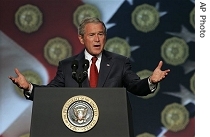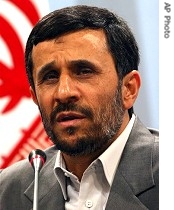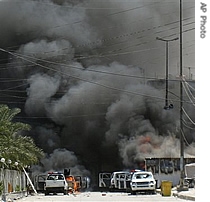2007年VOA标准英语-Tehran, Washington Heighten Rhetoric Over Iraq(在线收听)
Cairo
29 August 2007
U.S. troops in Baghdad briefly detained eight Iranians before releasing them and turning them over to Iraqi officials early Wednesday. The move comes amid heightened recriminations between Tehran and Washington, as VOA's Sonja Pace reports from our Middle East bureau in Cairo.
The U.S. military says it has released the eight Iranians, including two with diplomatic passports. The military says the Iranians were briefly detained for questioning, because unauthorized weapons were found in their vehicles.
It's not the first time U.S. troops have detained Iranians in Iraq. The military is still holding five Iranians detained in January in northern Iraq.
 |
| President George W. Bush gestures while addressing the American Legion 89th Annual Convention in Reno, Nev, Tuesday, 28 August 2007 |
Washington has long accused Iran of supporting violence in Iraq, and on Tuesday, U.S. President George Bush repeated his demand that Iran stop.
"The Iranian regime must halt these actions, and until it does, I will take actions necessary to protect our troops," said Mr. Bush.
 |
| Mahmoud Ahmadinejad (file photo) |
Speaking at a news conference in Tehran on Tuesday, President Mahmoud Ahmadinejad had a word of caution for Washington.
The power of the occupier in Iraq is collapsing, he said. The Iranian leader predicted an imminent power vacuum in Iraq, which he said Tehran, with the help of regional neighbors and friends, would be willing to help fill.
While Washington has called on Iran to play a more positive role in helping to stabilize Iraq, it also fears that Iran wants to increase its influence over Iraq and the region.
 |
| Smoke from burning cars rise after clashes broke out in the streets of Shiite holy city of Karbala, south of Baghdad, Iraq, 28 Aug 2007 |
"There is no way that Iran can control the various conflicts that are raging in Iraq today and I think that the security people in Iran are in fact extremely concerned about a U.S. withdrawal and about the fact that Iran will have to deal with the vacuum that will be left behind," he noted.
Hiltermann describes the situation in Iraq today as not just one, but a series of civil conflicts. He says that even though neither the United States nor Iran can stop them, it is important countries in the region be brought in as part of the solution to keep the violence from spreading beyond Iraq's borders.